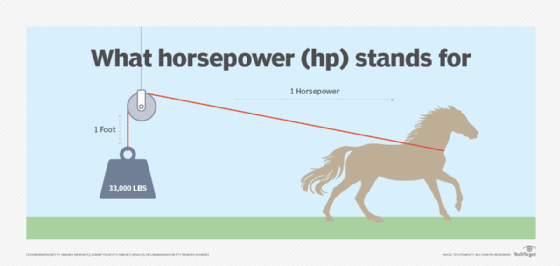horsepower (hp)
What is horsepower (hp)?
Horsepower (hp) is a unit of measurement in the foot-pound-second (fps or ft-lb/s) or English system, sometimes used to express the rate at which mechanical energy is expended.
The horsepower metric is defined as the work done by a force of 550 pounds acting through one foot in one second, or foot-pounds of work, the unit of power needed to raise 550 pounds one foot in one second.
Scottish Engineer James Watt invented the horsepower metric in the late 18th century to compare the output of steam engines with the power of draft horses. Watt realized that horsepower could be used to express the rate of engine power.
How do you calculate horsepower?
The answer is simple: horsepower is calculated by multiplying the amount of force (in pounds) by the speed (in feet per second).
So, let's say your car's engine can generate 200 pounds of force and move at a speed of 2 feet per second. The engine horsepower would be 400 (200 x 2).
Horsepower is often used to describe the power of cars, trucks and other vehicles. But it's also used to express the power that a machine, motor or engine produces.
The term horsepower is also sometimes used informally to describe a person's physical strength. For example, you might say that someone is "as strong as a horse" if they are very muscular.

What applications does horsepower have?
Horsepower is often used as a measure of engine power and other mechanical devices. For example, a small car might have a brake horsepower (bhp) of 100, while a large truck could have a brake horsepower of 500.
Horsepower is also used to describe the amount of work done by machines such as generators and pumps. For example, a small generator might have a horsepower of 5, while a large diesel engine generator could have a horsepower of 500.
Horsepower can also describe the amount of power that an electric motor can generate. For example, a small electric motor might have a horsepower of 1, while a large one could have a horsepower of 10. It can also be used to measure the power output of electric cars.
How do you convert horsepower into wattage?
A power level of 1 hp is approximately equivalent to 746 watts (W) or 0.746 kilowatts (kW).
- To convert from horsepower to watts, multiply by 746.
- To convert from watts to horsepower, multiply by 0.00134.
- To convert from horsepower to kilowatts, multiply by 0.746.
- To convert from kilowatts to horsepower, multiply by 1.34.
While horsepower, watt and kilowatt are all reducible to the same dimensional units (they each represent a specific rate of energy expenditure or power), horsepower is rarely used to express power in any form other than mechanical.
See also: Table of Physical Units, power, British thermal unit, International System of Units, Rankine cycle, motive power, turbine, distributed energy resources, Faraday constant
